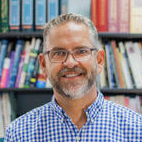I’m Reformed for a bunch of reasons. My reasons aren’t the same now as they were back when I was an arrogant eighteen-year-old, when I wielded a theological hammer in the shape of a tulip. It’s taken living a while. It’s taken being in ministry for fifteen years. It’s taken therapy. And what I’ve come to is the sober realization that the rabbit hole goes far deeper than my theological texts could have shown me.
The great Harvard poet Robert Bly has helped this journey. He’s no theologian, but wise to human complexity. Bly once wrote that humans learn early on that the world isn’t a very safe place. Imperfect parents, peer pressure, academic pressures, and more cause us to question whether or not parts of us are acceptable to others—particularly the darker parts, our zits and warts, our failures and fallibilities, our inabilities and disabilities. During our childhood, we begin putting these “unacceptable” parts of ourselves into a black bag, a bag that grows as we move through the pressures of high school into the rigors of college and the anxieties of marriage and family. By the time we hit our early thirties, Bly suspects, that black bag has greatly expanded, weighing down even the most resilient among us. If we’re wise, we open it and begin taking inventory of those forgotten parts, blind spots that require much courage to confront. However, sometimes the rabbit hole seems too deep, the challenge too great, and we re-double our efforts to protect ourselves from ourselves.
St. Paul says, “There is no one righteous,” and what he means is that none of us, not one, can claim purity. Purity, of course, is not about being squeaky clean. Rather, biblical purity is about wholeness of heart, sometimes called a “clean” or even an “undivided” heart in scripture. A lack of righteousness is a lack of integrity, a fundamental division that keeps us from seeing ourselves clearly and, as a result, from seeing our way to humility. When we’re feeling pretty good about ourselves, it’s easy to not need God. But when we see how deep the rabbit hole goes, we’re prone to run for help, to run to God. And then, as it turns out, our theology straightens out too, as the cross becomes central to the Story, and our stories.
Of course, that’s a hard thing. Relationships are difficult precisely because they expose us, revealing vulnerabilities we’d much prefer to keep hidden. Pastors, politicians, and professional athletes, perhaps more than others, face the pressure to keep the lid tightly on. Pastors, like me, talk a good game about sin’s potency, but we’re often poor models of self-awareness. It’s tough for all of us to open that black bag and to pull out yet another part of us we’ve been blind to. Just recently, I challenged a man to see a significant blind spot that everyone—family, employees, friends—seemed to see. His response? You’re asking for too much.
I get it. Who wants to open the black bag? Sure, this man is stubborn and arrogant. But I suspect he’s also very afraid. What will he find? What feelings will he face? What memories will be uncovered? How will it impact his job, his relationships, his standing among others?
As this man prepared to teach a church adult education class on “The Doctrines of Grace,” I could not help but think of the paradox. But then again, each moment like this is a reminder of my own paradoxes. In seventeen years of marriage, I’m continually reminded by my very gracious wife of the many ways in which I still disappoint her.
Yes, I’m Reformed for a bunch of reasons. And yes, it’s backed by good theology and good biblical thinking. But it’s taken more than that. Opening that black bag, we find that we’re far more complex and broken than we think we are. But at its bottom, we find the end of ourselves, and the beginning of hope. At the bottom of that dirty bag (and not in the squeaky clean idols of our self-deception), we find a humiliated Savior, who is not at all ashamed to meet us there. And just where we feel like life might end in depressing, dismal self-disintegration, we discover an embrace from One whose love is strong enough to put us back together, bit by bit, as we courageously enter in. And we just might find, too, that being Reformed is not so much about having the answers as engaging our biggest questions and blind spots, which, quite paradoxically, frees us to live and love with our whole hearts.

